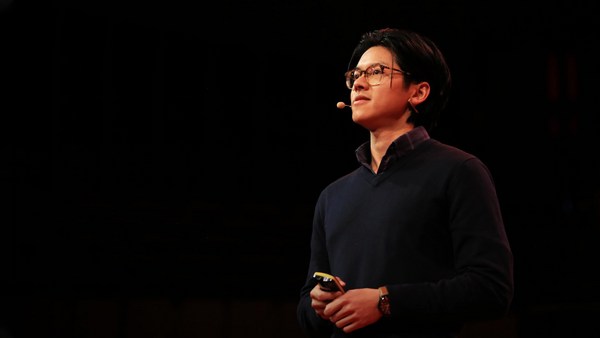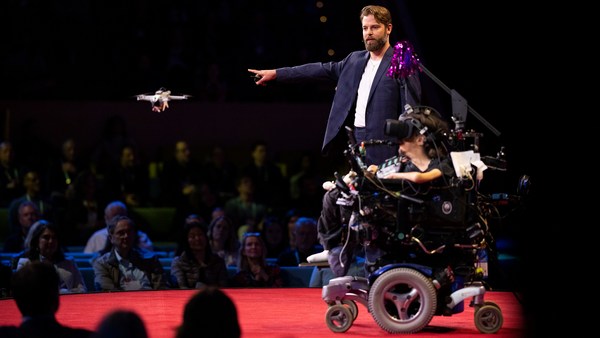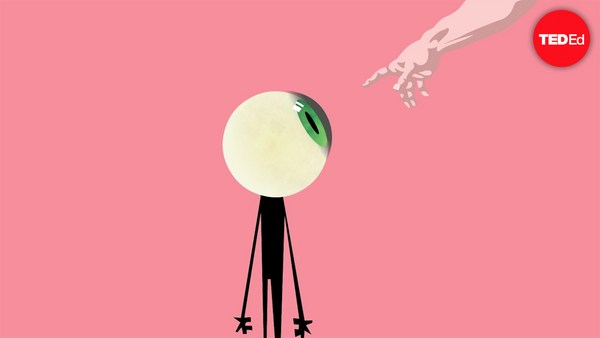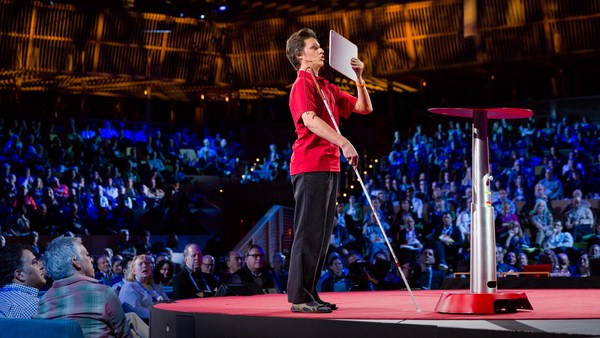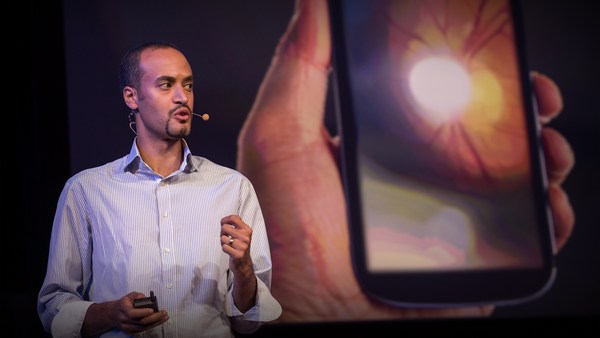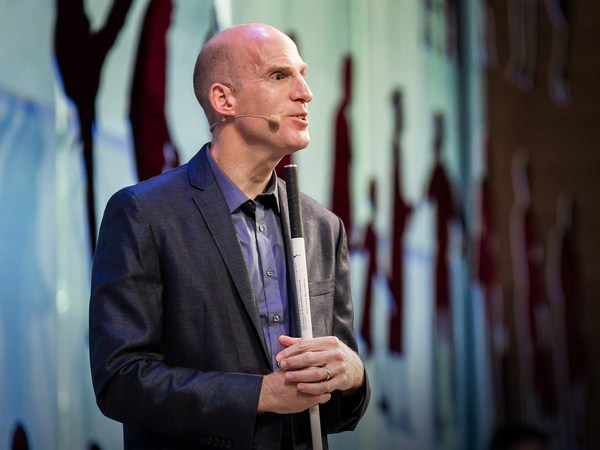(Audio description) A white man with glasses sits at a marble table next to a plate of sliced pears.
Hi, I'm Andrew Leland. I'm blind. And this is a TED Talk about blindness, which is confusing for me and for you because just by watching me right now, you can probably tell I'm not blind.
For example, I can tell that on this plate right here, there are five slices of pear arranged in a smiley face. Or that that --
(AD) A framed photo hangs on the wall behind him.
AL: Is a photograph of a very sad hippo. So you might be wondering, if I can see all that, why am I talking about blindness?
OK, so I'm going blind. I don't know exactly when. As a teenager, I was diagnosed with retinitis pigmentosa, or RP, which is a degenerative retinal condition. In my teens and early 20s, I only noticed it at night. Then in my early 30s, my peripheral vision started to deteriorate. Right now I have central vision, but I'm seeing the world through a pretty narrow porthole. So even though I can see these pears and that hippo, I'm legally blind. I have severe tunnel vision, but it doesn't look like a tunnel because your brain adapts really quickly to whatever you see. Like if the frame of the movie you're watching starts to shrink to a much smaller size, at first you'll be annoyed. "This sucks," you might say to yourself, "I don't like watching this movie on this tiny screen." Then your complaints will soften and disappear, and your brain will adapt to the new normal. Like the first time you watch a movie on your cell phone, it will be annoyingly small at first, and then you just get used to it.
So every time I lose another chunk of vision, at first I feel super extra blind, sometimes scared or claustrophobic. My world is shrinking. But then a week will go by, I get used to it, I don't feel so blind anymore.
This experience of super gradual vision loss has given me time to think about what blindness is, which might seem like an obvious question. Blindness is the absence of sight, but it's actually more complicated than that.
Trying to define blindness can start to feel paradoxical. There's a paradox that's useful in thinking about blindness. It's called the paradox of the heap. Let's say you have a heap of something, like sand or marbles or goji berries. Now imagine I take a single little goji berry off of the heap. Is it still a heap? OK, what if I remove a second tiny little goji berry from the heap? Obviously that is still a heap also. But, the ancient Greek philosopher wondered, at what point is it no longer a heap? How many goji berries do I have to remove? Is it still a heap when there's only ten left? Five? Vision works this way too. How much vision do I need to lose before I can legitimately call myself blind? I saw this photo online the other day.
(AD) In the photo, a Black woman holds a white cane and looks at a cell phone.
AL: The image circulated with a caption, "If you can see what's wrong, say 'I see it.'" Can you see what's wrong with this photo? The answer that the people sharing the photo had is that the woman can't be blind. If she is, why is she looking at her phone? Blind people don't look at things. The caption wants you to remember: blind people don’t see. And if she can see, what's she doing with that long white cane that signals to the world that she's blind? Maybe she's trying to get sympathy that she doesn't deserve or trying to trick us somehow.
So how blind you have to be to be blind? How much vision do you have to remove from the heap of sight before it becomes blindness?
People love binaries, especially people on the internet, which is a place that's not always very friendly to ambiguity. This photo was shared more than 33,000 times, and I think it went viral exactly because of its ambiguity. It illuminates a weird, paradoxical truth about blindness. Blind people can see. I don't mean this in the way that people mean it when they talk about Daniel Kish. Kish makes clicking sounds with his mouth that he uses to navigate his environment the way a bat uses sonar. Brain scans show that when Kish navigates his environment this way, using his DIY sonar, his visual cortex lights up. That's amazing. But the point I'm making is much simpler. On the one hand, blindness is a binary. You're either blind or you're not. But on the other hand, blindness is a spectrum. There are different degrees of blindness and different styles. Some people have the inverse of what I've got. They only see through their peripheral vision with nothing in the center. Other blind people see the world as though their glasses have been smeared with Vaseline or their head's been wrapped several times in saran wrap or like they're looking through a thick, broken fishbowl. Only very few blind people see nothing at all, total darkness.
As I lose my sight, I experienced this degeneration the way you might expect: as a loss. In the meantime, I feel privileged to still be able to see things like sunsets or tree frogs or celebrity breakfasts on Instagram. There's another paradox lurking around here. If blindness is a spectrum, could it also include somebody who's not actually blind? The paradox works the other way. How much sight do you have to add before someone's no longer blind? At a certain point, we do have to agree that someone's not blind, even if they don't see very well. I do think it's important to reserve blindness for people who don't have the luxury of correcting their vision, who need assistive technology to do things like read print or walk around. On the other hand, separating out blindness like this can lead people to view the blind as strange or mysterious or off-putting. And that can lead to fear and sometimes damaging misconceptions and stereotypes, like the idea that blind people are psychic, which some people actually believe, or that they have super hearing.
(AD) Words appear: Superpowers for the blind. The brain rewires itself to boost the remaining senses.
AL: Or more destructively, that they can't go to a normal school or hold a normal job or travel on their own.
So the next time you see a blind person do something that you think only a sighted person should do, like making eye contact with you or watching a movie, or standing at a bus stop checking their phone, remember, it might be possible to see even if you're blind.
